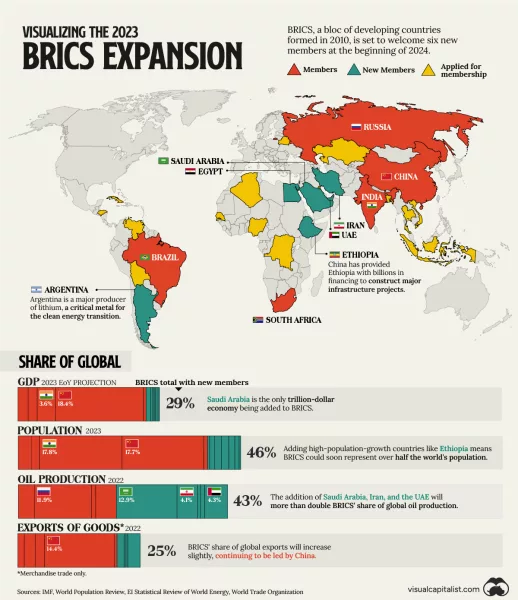Thirteen years after South Africa’s admission in 2010, the BRICS bloc – consisting of Brazil, Russia, India, China, and South Africa- has decided to expand again. On January 1st, 2024, six new members will officially be integrated into the alliance. More than forty states have shown interest in joining, and 23 have sent official applications. However, only a select few were chosen to enter the alliance following a consensus reached based on the “guiding principles, standards, criteria and procedures of the BRICS expansion process.”
Argentina, Ethiopia, Egypt, Iran, Saudi Arabia, and the United Arab Emirates will join the original five member states, more than doubling the size of the bloc. The political and economic implications of the new additions go far beyond the need for a new acronym. The goal of the expansion is the encouragement of a de-dollarized and multipolar world, an objective much easier theorized about than put into practice.
Taking quantitative data into account, it is clear that the bloc will benefit in many economic aspects following the expansion. The BRICS share of global GDP has increased from 25.77% to 29% with five member countries now having GDPs over the trillion-dollar mark. Similarly, the share of global exports will see a slight increase, rising from 18.28% to 20.58%. However, the greatest difference will be felt in the energy industry, with the BRICS’ share of global oil production having seen the most significant growth. The admissions of Saudi Arabia and the UAE, which produce 12,136 and 4,020 barrels of oil a day respectively, along with Iran’s contribution to the cause, will see the bloc’s global share of oil production per day more than double from 20.4% to 43.1%.
The bloc’s increased control over oil production is significant due to the consequences it will bring to the US dollar’s prominence in energy deals. With dollar-less trade deals becoming increasingly more common among the BRICS nations and prospective members, there is a growing feeling that the dollar is losing its prestige in the world’s financial markets. However, Dutch Bank ING insists that “Saudi pricing oil exports to China and India in non-dollar currencies does not end the dollar as the international currency of choice.” With energy deals comprising 15% of world trade, it is safe to assume that the dollar may not be completely thrown off balance by this change alone, but it is simultaneously unreasonable to expect that the currency will not be damaged.
Furthermore, the expanded bloc now holds approximately 46% of the world’s population, compared to the 40.9% it held previously. Effectively, this means that the alliance is in control of nearly half the world’s oil production and almost half its population as well. If the aim of BRICS is to pose as a counterweight to the West, the new changes will leave it more prepared for the challenge. The rumors of a new currency being developed support this pursuit. However, these notions are difficult to realize as new members such as Saudi Arabia and the UAE have local currencies that rely on the US dollar Yet, the bloc is not in a rush to create a financial system based on a single currency, as trade in the member states’ respective currencies is enough to get the alliance closer to its objective.

The addition of new members increases the potential for disagreements between the varying ideologies that now clash in the bloc. The primary example that comes to mind is the animosity between Saudi Arabia and Iran, whose diplomatic relations were only recently re-established with mediation from China. Considering the other new member states do not share many similarities, it is plausible to imagine that the new bloc might have difficulties reaching agreements on some important issues. Nonetheless, they have already started prioritizing trade in their respective currencies in many important deals, which suggests there could be general readiness to overcome differences in the face of mutual gain.
This strategic cooperation could be exactly the cause of worry among Western nations, with a noticeable difference in opinions regarding the environment and climate change between them and BRICS. The EU and G7 members generally stress more importance on the related issues while their BRICS counterparts are more concerned with economic growth. The rivalry between the two sides has evolved to a new level with the expansion of the latter, leaving behind the G7 in terms of GDP based on purchasing power parity (PPP).
China’s President Xi Jinping has expressed optimism at the BRICS summit, criticizing the USA’s “hegemony” during his speech and hailing the alliance’s expansion as “historic” and a “new starting point for BRICS cooperation.” Conversely, leaders of India and Brazil have shown concern about the bloc becoming excessively anti-West and Beijing-controlled. The potential for BRICS to become the West’s direct competitor for control of the world’s economic stage exists, but it hangs in the balance of the bloc’s ability to settle disputes and cooperate through the differences of its members.







